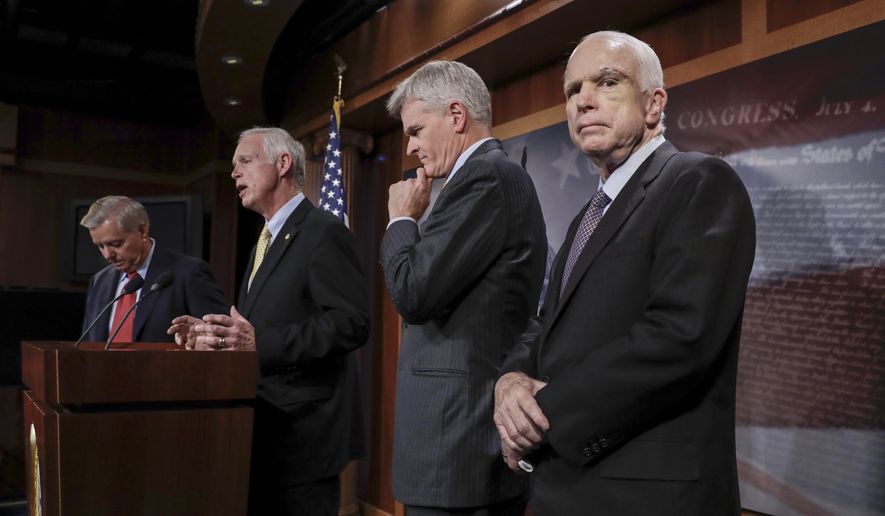Four Senate Republicans said Thursday they will not support a “skinny repeal” of Obamacare unless House Speaker Paul D. Ryan guarantees that it will be used to prolong talks on a broader overhaul, rather than make its way to the White House.
Sens. Ron Johnson of Wisconsin, Lindsey Graham of South Carolina, Bill Cassidy and John McCain of Arizona say the slimmed-down bill floated by leaders could rally their fractious conference and buy time for new reforms, but is horrible on its own.
“The skinny bill as policy is a disaster,” Mr. Graham said. “It is not a replacement in and of itself.”
Many Senate Republicans are worried that House lawmakers, desperate to repeal at least some of the 2010 Affordable Care Act, would decide to pass the skinny bill and send it to President Trump for his signature, raising the risk of premiums hikes next year.
House Minority Leader Nancy Pelosi late Thursday told her colleagues she feared GOP leadership would use fast-track authority to “jam it through” their chamber, should it pass the Senate before the weekend.
Senate Republicans got to this point because they failed to pass their own Obamacare replacement or clean repeal plan earlier this week.
Leadership views the skinny bill as a “lowest-common-denominator” bill to punt the debate into negotiations with the House in a conference committee.
Doing so would buy time for congressional scorekeepers and the Senate’s referee — the parliamentarian — to vet additional ideas that can pass with a simple majority, as Republicans try to pass an Obamacare rewrite under fast-track budget rules that avoid a Democratic filibuster.
“That makes eminent sense to me, on one condition — we actually go to conference,” Mr. Graham said.
As it stands, Senate GOP leaders are expected to offer the plan sometime late Thursday or early Friday.
Leadership hasn’t produced a formal bill, although details of the fallback plan were discussed during the Senate GOP’s closed-door lunch Thursday.
Aides said the plan would scrap Obamacare’s onerous mandates on individuals and employer, defund Planned Parenthood for one year and offer ways to let states duck some of the 2010 law’s insurance regulations. It would also take away a pool of Obamacare money that Republicans derided as a “slush fund” under the previous administration.
“My sense is people aren’t so much focused on the substance as this being the lifeline to get to conference,” Sen. Bob Corker, Tennessee Republican, said.
Insurers called the plan itself unworkable since it would repeal the mandate requiring individuals to get insurance or pay tax. Obamacare was premised on forcing healthier customers into the market place to balance out costly, sicker customers who could no longer be denied.
A partial repeal would “not solve the problems in the individual market, and in fact will result in higher premiums, fewer choices for consumers, and fewer people coverage next year,” Marilyn Tavenner, president and CEO of America’s Health Insurance Plans, wrote to Senate leaders, noting plans must set 2018 rates by mid August.
The Congressional Budget Office estimated that 16 million fewer people would hold insurance by 2026 under a plan that removes the mandate, according to an analysis requested by Senate Democrats.
Mr. Graham and company said they were heartened by House Freedom Caucus Chairman Mark Meadows, who said the skinny repeal should be dead on arrival.
The senators said House leaders haven’t made such a commitment, making them skittish.
It is unclear what kind of assurance House leaders could give to Senate Republicans, though they’re demanding one anyway.
“It’s like pornography,” Mr. Graham said. “You got to know it when you see it.”
• Tom Howell Jr. can be reached at thowell@washingtontimes.com.




Please read our comment policy before commenting.